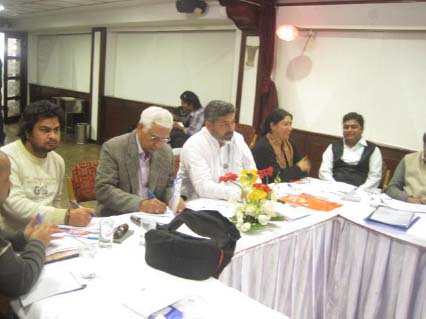/topics/wastewater
Wastewater
Draft National Water Policy (2012) fails to take into account the multiple, complex problems and issues relating to water in India says M S Vani
Posted on 18 Mar, 2012 05:49 PMGuest post by: M S Vani
Perusing the draft, one comes across all the ‘right’ concepts, words liberally sprinkled throughout the document, describing the resource:-
- Natural resource
- Hydrological cycle
- Ecological needs of rivers
- Climate change
- Sources pollution
and our intended response to it :-
Status of water supply in in class-I cities and class-II towns of Uttar Pradesh (UP)
Posted on 17 Mar, 2012 10:15 PMSource: Central Pollution Control Board’s 2009-10 Report
Class of cities/towns |
Integrated water management for rural/urban India: Common effluent treatment plant can conserve fresh water in industrial estates
Posted on 17 Mar, 2012 11:02 AMAuthors : Vasudevan Rajaram and John R. Sheaffer
National Environmental Engineering Research Institute seeks opinion from the public on the concept of groundwater recharge with treated municipal wastewater
Posted on 09 Mar, 2012 02:24 PMGuest post by: Anisha Nijhawan
CDD invites applications for Project Engineers and Documentation Specialist , Bangalore - Apply by March 17, 2012
Posted on 09 Mar, 2012 09:32 AMContent courtesy: DevNetJobsIndia
![]()
Consortium for DEWATS Dissemination (CDD) Society, an NGO involved in provision of cost effective and environmentally sound Decentralised Basic Needs Services (DBNS) for improved sanitation, is searching for Project Engineers and Documentation Specialist for its office in Bangalore.
Draft National Water Policy 2012 - Dialogue organised by NEER Foundation, Meerut on February 18, 2012
Posted on 27 Feb, 2012 10:07 AMGuest post by: Raman Kant Tyagi

Trends in private sector participation in the Indian water sector: A critical review - A Water and Sanitation Programme publication
Posted on 23 Feb, 2012 05:54 PMThe study also analyses the direction in which the sector is heading with respect to private sector participation. Since most PPPs are at early stages of operation, this study focuses only on learnings from PPP design and transaction. This study does not seek to assess the operating or financial performance of PPPs.
"In search of old ideas" - A discussion of the draft national water policy 2012, by Jayanta Bandopadhyay in The Telegraph
Posted on 22 Feb, 2012 05:05 PMAuthor: Jayanta Bandopadhyay
Article and image courtesy: The Telegraph
New water policy more contentious; least helpful in tackling existing issues
Posted on 22 Feb, 2012 12:34 PMAuthor : Dr. Arvind Kumar
"Water management in Mumbai: Prospects and challenges" - Videos from a round table organised by Observer Research Foundation
Posted on 16 Feb, 2012 03:51 PMThese four films include details of speeches made by the Municipal Commissioner of Brihan Mumbai Municipal Corporation (BMC), Mr Swadhin Kshatriya, who delivered a valedictory speech and Mr Sandeep Acharya, senior journalist from Loksatta, who expressed his views on the water crisis in Mumbai, as a part of a round table organised by Observer Research Foundation (ORF), on "Water management in Mumbai: Prospects and challenges", on the 10th of January 2010.





